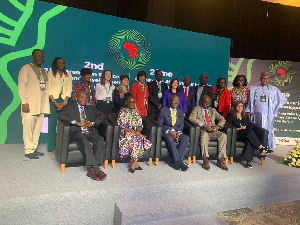 The two-day conference opened in Accra on Wednesday, November 13, 2024
The two-day conference opened in Accra on Wednesday, November 13, 2024
Ghana’s Minister for Health, Dr. Bernard Okoe Boye, has stressed that it has become more important than ever for Africa to take proactive actions in fighting against tobacco use.
In an address delivered on his behalf by Technical Advisor to the Minister of Health, Dr. Darious Osei, at the opening ceremony of the 2nd Africa Conference on Tobacco Control and Development on Wednesday, 13 November 2024, Dr. Okoe Boye highlighted the potential of Africa’s young population becoming a target for the tobacco industry, making such efforts even more crucial.
“The African continent, in comparison to other regions, still has a young population, with about 65% under the age of 30. This population segment is therefore a target and potential market for the tobacco industry. This disturbing position forces us to be proactive, act together, and involve all stakeholders in the tobacco control ecosystem. To protect our young people and future generations, there is an urgent need for a concerted effort in the fight against smoking in Africa,” he stated.
Despite Ghana’s relatively small adult population that uses tobacco (4%), the Minister highlighted various efforts undertaken by the government of Ghana to boost the fight against tobacco and affirmed the government’s unflinching commitment to the cause.
“In line with its commitment to tobacco control and the implementation of the FCTC, the government enacted the Public Health Act (Act 851) in 2012, which contains important tobacco control measures, and the Tobacco Control Ordinance (LI 2247) in 2016. In 2018, the Ghana Food and Drugs Authority (FDA) adopted new guidelines for the registration and labelling of tobacco products. This is an important step towards implementing the Protocol on the Elimination of Illicit Trade in Tobacco Products, which Ghana ratified in October 2021.
“More recently, Ghana passed the Excise Duty Amendment Bill (Bill 1093), which changed the structure of the tobacco tax from an ad valorem tax to a hybrid structure (ad valorem and specific tax). The Government of the Republic of Ghana, under the vision and leadership of His Excellency Nana Akufo-Addo, President and Head of State, intends to continue its efforts to better protect the health of the population, especially among the youth,” he said.
He expressed optimism about the impact of the conference on the collective fight against tobacco on the continent by bringing about practical resolutions and policies to steer the course.
Organised under the auspices of the African Capacity Building Foundation with support from the Bill and Melinda Gates Foundation, the African Conference on Tobacco Control and Development aims to promote information sharing and corroborative evidence to tailor tobacco control policy and implementation arrangements to Africa-specific contexts.
Speaking at the opening ceremony, the Executive Secretary for the African Capacity Building Foundation, Mamadou Biteye, said the theme for the second edition of the conference, “Advancing the Tobacco Control Ecosystem in Africa,” captures the collective mission of various stakeholders to create a “healthier, more sustainable, cleaner future environment for our future.”
“Our gathering today is more than just a conference; it is a convergence of minds and hearts dedicated to the cause of reducing the detrimental health, environmental effects, and other socio-economic ills associated with tobacco use. The World Health Organization (WHO) has documented tobacco use to be the leading cause of preventable death globally, more than HIV, tuberculosis, malaria, maternal mortality, accidents, and homicides combined. Tobacco kills over 8 million people each year, of whom 890,000 are non-smokers exposed to second-hand smoke, mainly women and children. This toll approximates 15,000 people dying daily from tobacco-related illness and disease, accounting for one death every 6 seconds,” he added.
He noted that despite efforts by African governments to curb tobacco use, the number of smokers on the continent is projected to more than double to 208 million by 2030.
This, he said, places the continent at a critical juncture that requires deliberate actions to deal with an issue that not only poses a health danger but also threatens the socio-economic development of the continent.
“The objectives we set forth for this conference are ambitious yet essential. We aim to share best practices and insights, amplify the voices of youth and women in our efforts, and confront the emerging challenges posed by new and emerging tobacco products. Our discussions will dive deep into countering new and emerging tobacco products, ensuring that our strategies are robust and forward-thinking. Together, we will explore the crucial intersection of environmental changes and tobacco control and discuss innovative methods for financing and sustaining our initiatives.
“This conference promises engaging conversations that will not only highlight the successes we have achieved but also the barriers we must overcome. Tobacco control is not an isolated issue; it intersects with various development sectors—education, agriculture, and climate resilience. It is only through collaboration and a unified approach that we can elevate tobacco control issues to the continental level, transforming them into a core part of our development agenda. By sharing our experiences, we can build a cohesive and resilient network of tobacco control actors across Africa,” he stated.